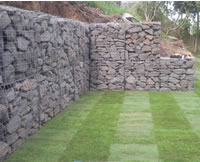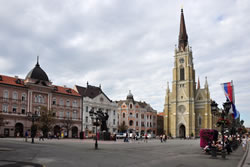| français | English | Cymraeg |
|---|---|---|
| décoller | to take off (plane) | codi; esgyn |
| le client | (hotel) guest | gwestai |
| l’invité | (house) guest | gwestai |
| la combinaison de plongée | wetsuit | siwt gweithgareddau dwr |
| le coup de glotte | glottal stop | ffrwydrolyn/stop glotol |
| (pousser un) coup de guele | (to have a) rant | rhefru; arthio; brygowthan |
| la guele-de-loup | snapdragon (Antirrhinum) | trwyn llo; safn y llew |
Les coups de glotte and other coups

Yesterday I discovered that the French for glottal stop is coup de glotte (“blow of the glottis”).
The word coup (blow, shot, stroke, wave, kick, punch, move) appears in many other expressions, including:
– (donner un) coup de balai = (to) sweep; shake up
– coup de vent = blow of wind
– coup de tête = header; whim
– coup de tabac = squall; gale
– coup de pied = kick
– c’est le coup de barre ! = it’s daylight robbery!
– j’ai le coup de barre ! = all of a sudden I feel totally shattered!
– coup de bol = stroke of luck (bol = bowl)
– coup de boule = headbutt
– coup de brosse = brushstroke
– coup de théâtre = dramatic turn of events
– coup de cafard = fit of the blues (cafard = cockroach)
– coup de chapeau = pat on the back (fig)
– donner un coup de chapeau à qn/qch = to give sb/sth full marks; to praise sb/sth
– coup de chapeau à X ! = hats off to X!
– coup d’état = coup (d’État); putsch
– coup de grâce = coup de grace; deathblow
– (pousser un) coup de gueule = (to have a) rant
Gueule is another interesting word that came up in the French conversation group yesterday and which means the mouth/snout/muzzle of an animal, and is used as a slang word for a person’s mouth – the equivalent of mug, gob, cakehole, etc in English. Do you have any others?
One quite rude way to tell people to be quiet in French is “Ta gueule !”, and if you drink a lot of alcohol you might wake up the following morning with une gueule de bois (“a wooden gob”) or a hangover. A gueule-de-loup (“wolf’s snout”), on the other hand, is a snapdragon (Antirrhinum), which is a trwyn llo (“cow’s nose”) or a safn y llew (“lion’s mouth”) in Welsh. By the way, the botanical name for snapdragon, Antirrhinum, comes from Greek and means “like a nose”.
Changing accents
I heard an interesting discussion on Radio Cymru recently about accents. They talked about Welsh, and English, regional accents that have negative associations for people from other regions, or that people find difficult to follow, and whether they would change their accent to make it easier for others to understand them, and/or to avoid the negative associations.
My accent has changed a bit over time – it is currently more or less RP, but used to be more northern, and it depends to some extent though on who I’m talking to. I haven’t tried to change it deliberately. The only thing I consciously pay attention to in formal situations is the pronunciation of th [θ/ð], particularly the unvoiced version, [θ], which tends to default to [f].
Are the negative associations with accents from particular parts of your country, or with accents of particular social groups within your country?
Have you deliberately changed your accent in your native language(s)? If so, what led you to do so?
Language quiz
Here’s a recording in a mystery language.
Can you identify the language, and do you know where it’s spoken?
Les mots de la semaine
| français | English | Cymraeg |
|---|---|---|
| la poêle (à frire) | frying pan | padell ffrïo |
| le mixeur | (food) mixer | cymysgwr |
| la bétonnière | cement mixer | corddwr sment; peiriant cymysgu sment |
| le mélangeur | mixer tap | tap cymysgu |
| le plachard-séchoir | airing cupboard | cwpwrdd sychu/eirio/tempru |
| plein à craquer | full to bursting; crammed | llawn dop; llawn hyd yr ymylon |
| noir de monde | swarming with people | yn heidio o bobl; yn orlawn o bobl |
| le perroquet | parrot | parot; poli-parot |
| répéter comme un perroquet | to parrot; to repeat parrot fashion | ailadrodd (fel poli-parot) |
| l’amure (f) | armour | arfwisg; arfogaeth |
| le chevalier | knight | marchog |
Motivation
There’s an interesting article in the Guardian I came across today about motivation in language learning.
The article discusses different types of motivation, and concludes that three things that are particularly important in language learning are working memory; associative memory – how well you content new and known information; and your ability to learn implicitly – that is the ability to spot patterns. If you have a good level in these skills, plus a high level of motivation, you are more likely to succeed.
What motivates you to learn languages?
For me it’s a combination of interest in the languages themselves, and in aspects of the cultures associated with them, especially music and literature.
Gabions and the importance of names

The other day I discovered that the name for those wire cages filled with rocks used in construction and to stabilise river banks, hillsides and shorelines are called gabions. The word comes from the Italian gabbione (big cage), which comes from the Latin cavea (cage).
There are plenty of gabions around here, but I didn’t know what to call them before, apart from wire baskets filled with rocks and stones, or something similar. I find that knowing the name of something makes it so much easier to talk about it – would you agree?
For example, if you go for a walk in the country and want to point out particular flora and fauna that you see, or want to describe what you saw afterwards, it helps if you know the names of things. So instead of saying that you saw some trees, flowers and birds, you might say that you saw oak, beech and ash trees; dandelions, old man’s trousers and buttercups, and so on. Some people, like my mum, could probably give you the Latin names of some of the flora as well.
Knowing the names of things, in your native language, and in other languages you know, enriches your world and enables you to talk about a variety of things without having to resort to paraphrases and long descriptions. The common names of flora and fauna can be interesting and poetic even – for example, the Irish name for fuschia is deaora dé (“God’s tears”). I learnt this word first in Irish, then found out what the plant is called in English.
I’m quite good at the names of birds and animals in English, Welsh, French and Irish, but not so good at plants and trees, which I’m working on.
Language quiz
Here’s a song in multiple languages.
Can you identify the language, and do you know where it’s spoken?
Les mots de la semaine
| français | English | Cymraeg |
|---|---|---|
| fait(e) maison; artisanal | home-made | cartref |
| la course de chevaux | horse race | ras geffylau |
| le cheval de course | race horse | ceffyl rasio; ceffyl ras |
| le hoquet | hiccough/hiccup | yr ig; yr igian |
| hoqueter | to hiccup | igian |
| le contretemps | hiccup (small problem) | rhwystr |
| j’ai le hoquet | I’ve got the hiccups | mae’r ig(ian) arna’ i |
| prévisible | predicatable | rhagweladwy; disgwyliadwy; rhagddywedadwy |
Novi Sad

As I’m going to the Polyglot Conference in Novi Sad (Нови Сад) [nôʋiː sâːd] in October, I thought I should find out what Novi Sad actually means – it’s the kind of thing I like to know. I guessed that Novi probably means new, but had no idea what Sad might mean.
According to this dictionary, нови means new and сад means ‘plantation’.
Wikipedia translates the name as ‘New Garden’, and gives versions of the name in a number of languages used in local administration:
– Serbian: Нови Сад, Novi Sad
– Hungarian: Újvidék (‘new territory/region/land’)
– Slovak: Nový Sad
– Rusyn: Нови Сад (Novi Sad)
In Latin it’s known as Neoplanta, and as Novi Sad in Croatian and Romanian.
The word сад / sad comes from the Proto-Slavic *saditi (to plant), and means vessel, container or dish in Macedonian; garden, orchard or park in Russian and Ukrainian; orchard in Czech and Polish; fruit in Lower Sorbian; and garden, orchard or plantation in Slovak.
Sources: http://en.wiktionary.org/wiki/сад and http://en.wiktionary.org/wiki/sad